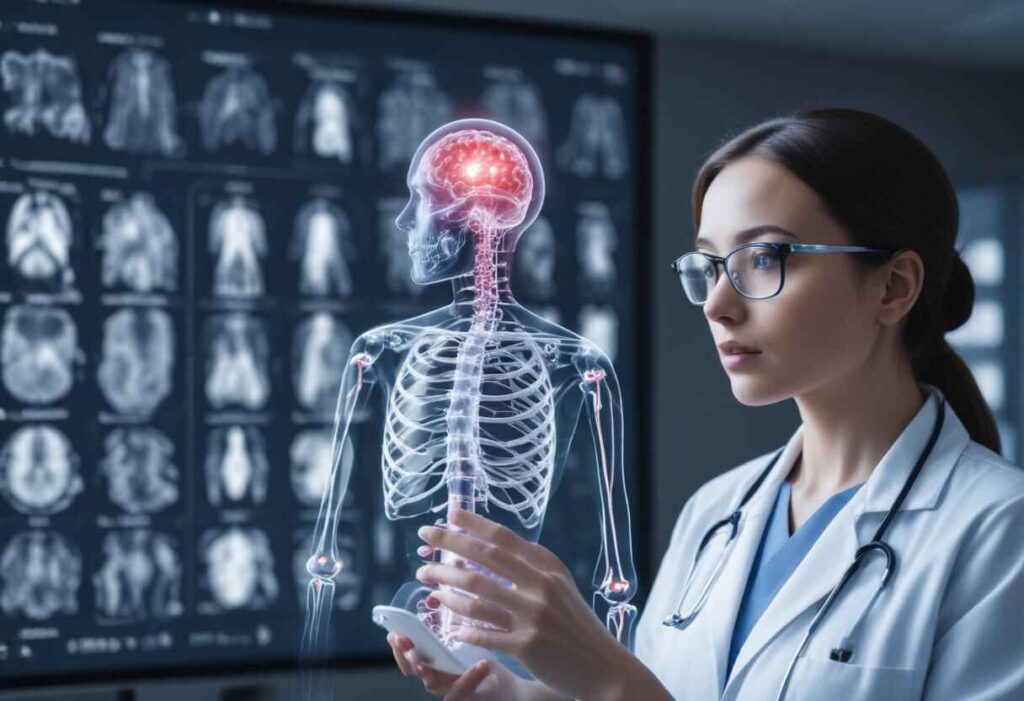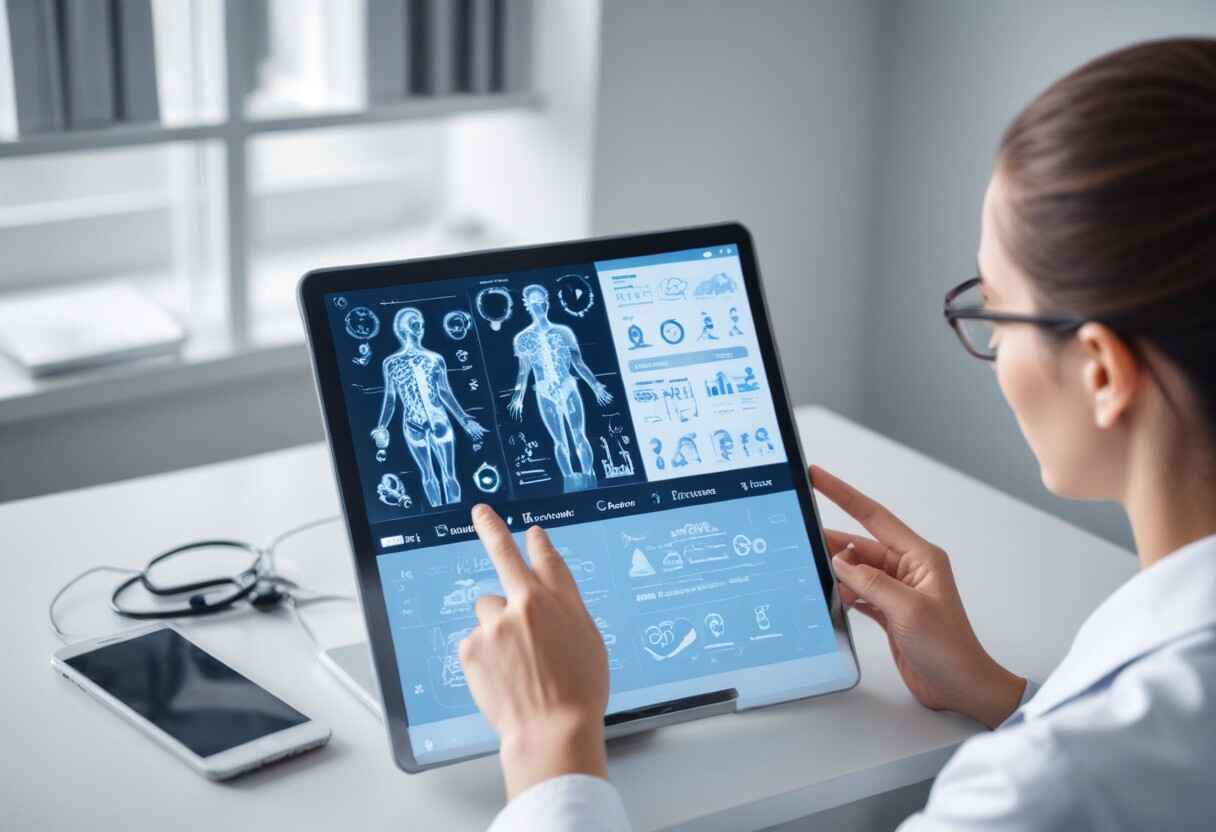Healthcare is changing a lot because of artificial intelligence (AI). As technology improves, AI is becoming more important in digital health, changing how we care for patients. AI helps with early diagnosis and creates personalized treatment plans, making healthcare more efficient, accurate, and available to everyone. Let’s explore how AI is transforming patient care in the world of digital health.
Early Diagnosis and Predictive Analytics
AI is making a big difference in healthcare, especially in finding diseases early. Traditional ways of diagnosing can take a lot of time and may have errors. But AI can quickly and accurately look at medical data like images and lab results. For example, AI is used to find cancers, such as breast and lung cancer, by analyzing mammograms and CT scans better than human doctors. Finding these diseases early means treatment can start sooner, which greatly improves the chances for patients.
AI is also very helpful in predicting health issues. By looking at a lot of patient data, AI can spot patterns and predict future health problems, like heart attacks or strokes. This helps doctors take steps to prevent these issues, saving lives and reducing healthcare costs.
Personalized Treatment Plans

AI is changing how doctors create treatment plans. Usually, treatment plans are the same for everyone, which might not work well for every patient. AI helps make personalized treatment plans by looking at each patient’s unique data, like their genes, lifestyle, and medical history. For example, AI can assist cancer doctors in customizing treatments based on the specific genetic changes in a patient’s tumor, making the therapy more effective and with fewer side effects.
Additionally, AI tools can keep track of patients continuously and update treatment plans as needed. For people with ongoing conditions like diabetes or high blood pressure, AI can analyze data from wearable devices and suggest changes to medications or lifestyle, helping to manage the condition better.
Enhancing Patient Monitoring and Care
Continuous monitoring is important for managing long-term diseases and keeping patients safe. AI-powered wearable devices and remote monitoring systems help healthcare providers watch patients’ vital signs and health metrics in real-time. These devices can alert doctors to any unusual readings so they can act quickly. For example, AI can detect irregular heartbeats or changes in blood sugar levels, allowing for fast medical response.
Also, AI chatbots and virtual health assistants are improving patient care by giving instant medical advice and support. These AI tools can answer patient questions, remind them to take medications, and even schedule appointments, making healthcare easier and more convenient.
Streamlining Administrative Tasks

AI is improving not just patient care but also making administrative tasks easier for healthcare workers. Administrative tasks like scheduling appointments, managing patient records, and billing can take up a lot of time and resources. AI systems can handle these tasks automatically, giving healthcare professionals more time to care for patients.
For instance, AI can automate patient triage by analyzing symptoms and directing patients to the right care level. This makes the process more efficient and ensures patients get timely and proper treatment.
Advancements in Medical Research
AI is speeding up medical research by analyzing huge amounts of data that humans can’t handle on their own. Machine learning algorithms can go through millions of medical records, research papers, and clinical trial data to find potential treatments and medicine interactions. This helps discover new medications and therapies faster, getting them to patients sooner.
AI also helps develop precision medicine, where treatments are customized based on a patient’s genetic makeup. By analyzing genetic data, AI helps researchers understand how different patients respond to treatments, leading to more effective and personalized therapies.
Addressing Ethical and Privacy Concerns

While AI can greatly improve patient care, it also brings up important ethical and privacy issues. Keeping patient data secure is crucial because data breaches can cause serious harm. Healthcare providers need to use strong data protection methods and follow strict privacy rules to protect patient information.
Also, the use of AI in healthcare should be clear, and patients should know how their data is being used. Ethical concerns, like avoiding biases in AI algorithms, are important to ensure that all patients receive fair and equal treatment.
Medicine Discovery and Development
AI speeds up finding new medicines by looking at huge amounts of data to find possible medicine candidates. Machine learning can guess how different substances will work with biological targets, making the early stages of medicine development much faster. This helps discover new treatments and therapies more quickly and cheaply.
Improved Patient Engagement
AI-powered chatbots and virtual health assistants give patients quick access to information and support. These tools can answer common health questions, remind patients to take their medication, and offer advice on managing chronic conditions. By keeping patients engaged and informed, AI helps them stick to their treatment plans and take charge of their health.
Conclusion
AI is changing how healthcare works in digital health, making it more accurate, personalized, and efficient. It helps with early diagnosis, creates personalized treatment plans, monitors patients continuously, and makes administrative tasks easier. AI is transforming every part of healthcare. As technology gets better, AI will likely be used more, bringing even more new ideas to improve health. But we need to think about ethical and privacy issues to make sure AI in healthcare helps everyone fairly and safely. The future of healthcare looks promising with AI leading the way into a new digital health era.
